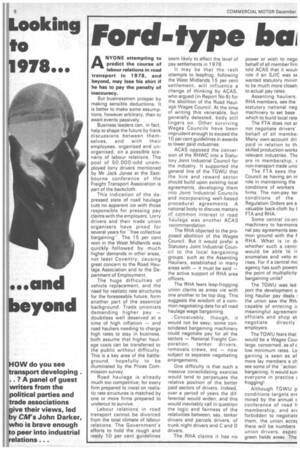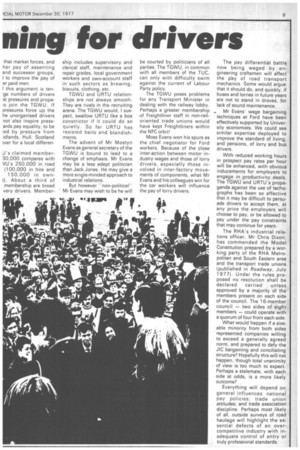Ford-type bet ming for drivers
Page 10

Page 11

If you've noticed an error in this article please click here to report it so we can fix it.
NYONE attempting to predict the course of labour relations in road transport in 1978, and beyond, may lose his shirt if he has to pay the penalty of inaccuracy.
But businessmen prosper by making sensible deductions. It is better to make some assumptions, however arbitrary, than to await events passively.
Business leaders can, in fact, help to shape the future by frank discussions between themselves, and with their employees, organised and unorganised, on a possible scenario of labour relations. The pool of 50,000-odd unemployed lorry drivers mentioned by Mr Jed( Jones at the Eastbourne conference of the Freight Transport Association is part of the backcloth.
This indication of the de pressed state of road haulage cuts no apparent ice with those responsible for pressing pay claims with the employers. Lorry drivers and their trade union organisers have pined for several years for "free collective bargaining". The 15 per cent won in the West Midlands was quickly followed by much higher demands in other areas, not least Coventry, causing great concern to the Road Haulage Association and to the Department of Employment.
The huge difficulties of vehicle replacement, and the need for realistic rate structures for the foreseeable future, form another part of the essential background. Trade unionists demanding higher pay — doubtless well deserved at a time of high inflation — and road hauliers needing to charge high rates to stay in business, both assume that higher haulage costs can be transferred to the public without difficulty. This is a key area of the battleground, . hopefully to be illuminated by the Prices Commission survey.
Road haulage is already much too competitive; for every firm prepared to insist on realistic rate structures is matched by one or more firms prepared to undercut to survive.
Labour relations in road transport cannot be divorced from the total climate of labour relations. The Government's efforts to hold the rough and ready 10 per cent guidelines seem likely to affect the level of pay settlements in 1978.
It may be that the rash attempts to leapfrog, following the West Midlands 15 per cent settlement, will influence a change of thinking by ACAS, who argued (in Report No 6) for the abolition of the Road Haulage Wages Council. At the time of writing this venerable, but generally detested, body still lingers on. Other surviving Wages Councils have been imprudent enough to exceed the 10 per cent guidelines in awards to lower paid industries.
ACAS opposed the conversion of the RHWC into a Statutory Joint Industrial Council for the industry. It supported the general line of the TGWU that the hire and reward sector should build upon existing local agreements, developing them into Joint Industrial Councils and incorporating well-based procedural agreements. A national body to discuss matters of common interest in road haulage was another ACAS recommendation.
The RHA objected to the proposed abolition of the Wages Council. But it would prefer a Statutory Joint Industrial Council to the local bargaining groups, such as the Assenting Hauliers, established in many areas with — it must be said — the active support of RHA area officers.
The RHA fears leap-frogging union claims as areas vie with one another to be top dog. This suggests the wisdom of a common negotiating date for all road haulage wage bargaining.
Conceivably, though, it would not be easy; some consolidated bargaining machinery could negotiate pay for all the sectors — National Freight Corporation, tanker drivers, removals crews, etc — now subject to separate negotiating arrangements.
One difficulty is that such a massive consolidating exercise would tend to perpetuate the relative position of the better paid sectors of drivers. Indeed, over a period of years the differential would widen, and this would inevitably call in question the logic and fairness of the relativities between, say, tanker drivers and parcels drivers, of trunk night drivers and C and D drivers.
The RHA claims it has no power or wish to nego behalf of all member firn
told ACAS that it wouli role if an SJIC was SE wanted statutory minirr to be much more close!) to actual pay rates.
Assenting hauliers, RHA members, see thefl statutory national neg machinery to set base which to build local rate
The FTA does not ar not negotiate drivers' behalf of all membei Many own-account dri. paid in relation to th skilled production workE relevant industries. ThE are in membership, c non-transport trade unic The FTA sees the Council as having an in role in maintaining the conditions of workers firms. The non-pay ter conditions of the Regulation Orders are s, valuable back-cloth by I FTA and RHA.
Some central co-ort machinery to harmonis nal pay agreements seei mon ground with the F RHA. What is in di whether such a centr, would be able to ir anomalies and veto e) rises. For if a central mo agency has such powerz the point of multiplicity bargaining units?
The TGWU was led port the development o ting haulier pay deals I the union saw the RH) capable of entering it meaningful agreemeni officials and shop st negotiate directly employers.
The TGWU fears that would be a Wages Cow large, concerned, as of c low minimum rates. Lo gaining is seen as af more lay members a ch see some of the "action' bargaining. It would sun everyone in practice t frogging!
Although TGWU p conditions targets arE mined by the annual c conference of road h membership, and art forbidden to negotiatE them, the union accej there will be numbers union drivers, espec green fields areas. The that market forces, and her pay of assenting and successor groups, to improve the pay of or paid men.
f this argument is tenge numbers of drivers St pressures and propa:o join the TGWU. If pressures force up the he unorganised drivers not also inspire pressards pay equality, to be ed by pressure from idlands, Hull„ Scotland )ver for a local differen J's claimed member30,000 compares with VU's 250,000 in road (100,000 in hire and 150,000 in ownt). About a third of membership are bread very drivers. Member ship includes supervisory and clerical staff, maintenance and repair grades, local government workers and own-account staff in such sectors as brewing, biscuits, clothing, etc.
TGWU and URTU relationships are not always smooth.
They are rivals in the recruiting arena. The TGWU would, I suspect, swallow URTU like a boa constrictor if it could do so quietly. So far URTU has resisted baits and blandishments.
The advent of Mr Mostyn Evans as general secretary of the TGWU is bound to lead to a change of emphasis. Mr Evans may be a less adept politician than Jack Jones. He may give a more single-minded approach to industrial relations.
But however "non-political" Mr Evans may wish to be he will be courted by politicians of all parties. The TGWU, in common with all members of the TUC, can only with difficulty swim against the current of Labour Party policy.
The TGWU poses problems for any Transport Minister in dealing with the railway lobby. Perhaps a greater membership of Freightliner staff in non-railoriented trade unions would have kept Freightliners within the NFC orbit!
Moss Evans won his spurs as the chief negotiator for Ford workers. Because of the close inter-action between motor industry wages and those of lorry drivers, especially those involved in inter-factory movements of components, what Mr Evans and his colleagues win for the car workers will influence the pay of lorry drivers. The pay differential battle now being waged by en gineering craftsmen will affect the pay of road transport mechanics. Some would argue that it should do, and quickly, if buses and lorries in future years are not to stand in droves, for lack of sound maintenance.
Mr Evans' wage bargaining techniques at Ford have been effectively supported by Univer sity economists. We could see similar expertise deployed to improve the standard of living, and pensions, of lorry and bus drivers.
With reduced working hours in prospect pay rates per hour will be enhanced, with obvious inducements for employers to engage in productivity deals.
The TGWU and URTU's propa ganda against the use of tachographs has been so effective that it may be difficult to persu ade drivers to accept them, at any price the employers will choose to pay, or be allowed to pay under the pay constraints that may continue for years.
The RHA's industrial relations officer, Mr Chris Dixon, has commended the Model Constitution prepared by a working party of the RHA Metro politan and South Eastern area and the transport trade unions (published in Roadway, July 1977). Under the rules pro posed no resolution shall be declared carried unless approved by a majority of the members present on each side of the council. The 16-member council — two sides of eight members — could operate with a quorum of four from each side.
What would happen if a sizeable minority from both sides represented companies willing to exceed a generally agreed norm, and prepared to defy the JIC bargaining and conciliating structure? Hopefully this will not happen, though total unanimity of view is too much to expect. Perhaps a stalemate, with each side at odds, is a more likely outcome?
Everything will depend on general influences national pay policies; trade union attitudes; and trade association discipline. Perhaps most likely of all, outside surveys of road
haulage will highlight the essential defects of an over
competitive industry with inadequate control of entry or truly professional standards.




























































